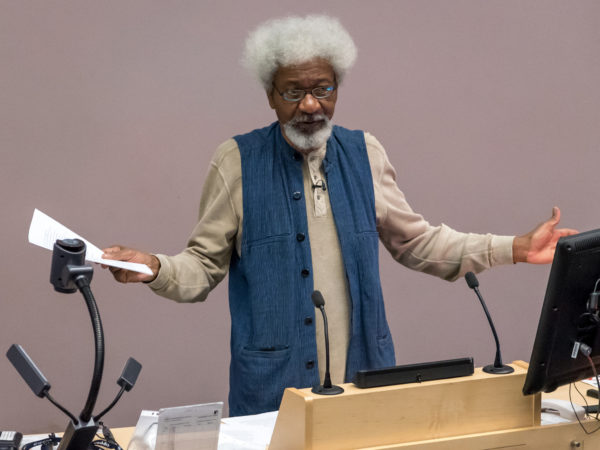Soyinka’s recent essay, titled “War In Nigeria: Victory Remains Elusive, 50 Years On,” contains a lot of helpful insights on the Biafra question.
Nigeria’s civil war of the late 1960s was re-introduced into the global imagination with the publication Chimamanda Adichie’s Half of a Yellow Sun. Chinua Achebe’s last book before his passing also resurrected troubling questions about the violence that took place during the war. With the rise in recent years of separatist political groups drawing inspiration from the Biafra War, the question of the war and its legacies have returned to the center of Nigerian political discourse.
Soyinka’s reflections in this essay published in Newsweek adds a measure of perspective to the national debate. The essay is beautiful and heartfelt. He talks about the devastating effects of the war on Igboland. Some of you might recall that Soyinka was jailed during the thick of the war for what the Nigerian government saw as his treasonous collusion with Biafran authorities. In the essay, he revisits his experience in detention. But the true power of the essay lies in its provocative commentary on the future of Biafra, which he introduces with the question: “Should Biafra stay in, or opt out of Nigeria?” Soyinka also has some really smart things to say, more generally, about the idea of nationhood in the African context.
Enjoy this excerpt.
***
Malnutrition, Red Cross, kwashiorkor, relief flights, genocide, the Uli airstrip used by Biafran planes to elude the Nigerian blockade, mercenaries, the Aburi accord that broke down and led to war—these are some of the memory triggers of the Nigerian civil war of secession that we would like to re-assign.
Over a million lives perished—a shameful proportion of them children—mostly through starvation and aerial bombardment. The Nigerian federal government, committed to the doctrine of oneness, had boasted that the conflict would last no longer than three weeks of “police action.” We had learnt much from the politics of other nations, but apparently not from history; the war lasted more than two years.
Tormented by the image of a herd of human lemmings rushing to their doom, as a young writer, I made the “treasonable” statement warning that the secessionist state, Biafra, could never be defeated. The simplistic rendition of that conviction in most minds—certainly in the minds of the then-ruling military and its elite support—was that this applied merely to the physical field of combat. Thus it was regarded as a psychological offensive against the federal side, an attempt to demoralize its soldiers while boosting the war spirit of the enemy. That “enemy” had also boasted that no force in black Africa could defeat them.
***
Today, most Nigerians know better. Biafra has not been defeated. If anyone was left in any doubt about this, the last work of my late colleague, Chinua Achebe’s There Was A Country, has left us re-thinking. New generation writers, born long after that brutal war, have inherited and continue to propagate the Biafran doctrine, an article of faith among the Igbo populace, even among those who pay lip-service to a united nation. Millions remain sworn to uphold it. Many have died at the hands of the police and the military as succeeding guardians of that legacy troop out to reclaim it in defiant manifestations. Amnesty International estimated that at least 150 pro-Biafra activists have been killed since August 2015. Some of their leaders, including the director of their official mouthpiece, Radio Biafra, remain on trial for alleged subversion and treason. Others have gone underground.
***
Should Biafra stay in, or opt out of Nigeria? That is the latent question. Even after years of turbulent co-tenancy, it seems unreal to conceive of a Nigeria without Biafra. My preference for “in” goes beyond objective assessment of economic, cultural and social advantages for Biafra and the rest of us.
***
Today’s global realities make multi-textured nations far more compelling, not only for outside investors—tourists included—but equally inspiring to the occupants of any nation space. The West African region is marked by an intersection of horizontally and vertically-formed groupings and identities, the result of colonial intervention in the race for territory. The result has proved often dispiriting but just as often stimulating. It has gone on for long, with developmental structures whose dismantling strikes one as being potentially perilous even for the most resilient and endowed of the resultant pieces.
Among many analogies, I have heard and read Nigeria described as a ticking time-bomb. Ironically, I see in this very fear a strong argument for remaining intact. An explosion in closed space is deadlier than in a wider arena which stands a chance of diffusing the impact and enabling survival. My preference for remaining one is thus reinforced by that very doomsday prediction, not by any presumptive law of human association.
Among the lessons learnt today is that changing the content of geography texts does not obliterate the fundamental attachment to an idea. The Bight of Biafra was renamed during the civil war—to expunge the secessionist consciousness—but that ruse has clearly failed. Orders from a section of Igbo leadership for restoration of the original name is a warning that the Biafran narrative has not ended. When added to the widely spread observance earlier this year of sit-at-home protests to mark Biafra Day on May 30, it would be wise to respond with a fresh understanding to the pulsation of the new Biafran generation.
Read the full essay HERE.
*******
Post image by Jodie C via Flickr.
Facebook link image by Jacob Valerio on Unsplash









COMMENTS -
Reader Interactions